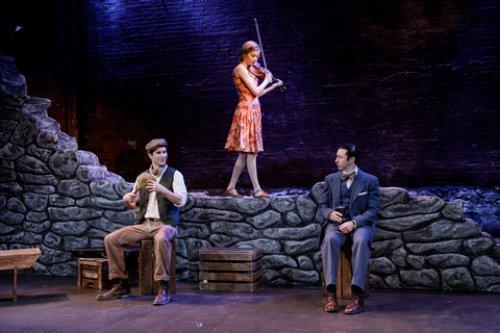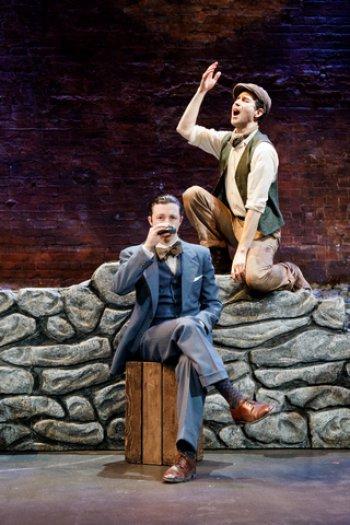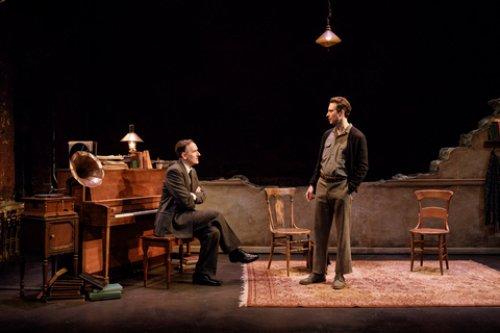A Walk With Mr. Heifetz
Unknown composer Yehuda Sharett wants advice from Jascha Heifetz in Palestine, 1926. Almost 20 years later his brother Moshe, in line to be prime minister of Israeli, has advice for him.

Yuval Boim, Mariella Haubs and Adam Green in a scene from “A Walk With Mr. Heifetz” (Photo credit: James Leynse)
[avatar user=”Victor Gluck” size=”96″ align=”left” ] Victor Gluck, Editor-in-Chief[/avatar]Not all historic events ought to or can be dramatized. Unknown composer and kibbutz pioneer Yehuda Sharett wants advice from violinist Jascha Heifetz in Palestine in 1926. Almost 20 years later his brother Moshe, in line to be prime minister of Israel, has advice for his now famous brother, reminding him of his walk with Heifetz years ago. Both of these events took place. This is the basis of journalist James Inverne’s first play, A Walk With Mr. Heifetz. Unfortunately, there is no record of what was said in either conversation so Inverne puts words in their mouths and invents a theme: how does one create music to elevate a new country?
In 1926, the world’s most famous violinist Jasha Heifetz famously gave a concert in a quarry in British-protectorate Palestine. Sharett, the choirmaster, amateur violinist and would be composer at the Kibbutz Yagur walked all the way to the concert to meet Heifetz. Sharett whom no one can say no to has convinced Heifetz to go for a walk to the top of a hill to see the view of the country. In reality, Sharett wants to ask the violinist a question which troubles him. How can he create music to forward the future of the new land? However, he starts by criticizing the luxurious life style of the celebrated violinist, insisting that an artist has a responsibility to his community. Heifetz, bemused by the young man’s candor and impressed by his passions gives him some advice, but it is not what Sharett is expecting.

Adam Green and Yuval Boim in a scene from “A Walk With Mr. Heifetz” (Photo credit: James Leynse)
Almost 20 years later in 1945 on the eve of the new state of Israel, Moshe, Yehuda’s brother and statesman, third most famous man in the country after Chaim Weizmann and David Ben Gurion, visits him at his home at Kibbutz Yagur. It is five years since they have seen each other and Yehuda has suffered a great loss. Moshe has heard that his brother has become a recluse, no longer even composing music. Reminding him of his talk with Heifetz all those years ago, Moshe attempts to get his brother to return to his mission of writing music that will inspire the new country of Israel which is waiting to be born.
Even at 90 minutes, the play seems rather emaciated as Inverne does not give his characters much to say. They mostly go round and round over the few same topics. Much of the play is on the level of chit chat and nothing much seems to be at stake. As composer Yeduha Sharett is not a household name in America, he seems like an invented character without much substance other than his passions: the play assumes that we know about his life and career. The drama also includes a violinist (played by Mariella Haubs) who performs live at strategic moments in the story but is more of a device than an integral part of the story line.

Erik Lochtefeld and Yuval Boim in a scene from “A Walk With Mr. Heifetz” (Photo credit: James Leynse)
Andrew Leynse, artistic director of Primary Stages, obtains polished performances from his three actors but they remain two dimensional. His blocking contains a great deal of pacing from one actor in each act. As Yehuda Sharett, Yuval Boim is full of nervous energy, naïve and intense, unsure of himself in the first, racked by guilt in the second. Erik Lochtefeld is suave and elegant as his brother Moshe, the diplomatic statesman who is always careful to qualify everything he says.
In the underwritten role of Jascha Heifetz, Adam Green is retiring, wry and dignified without giving much away. He is mostly an ear to hear Yehuda’s complaints and dreams. Nor do we find out much about his life and career other than that he left St. Petersburg at 16 and couldn’t return due to the Revolution which ended the Russia he knew. Ironically, although Yehuda and Jascha are both 25, Green comes across as a much older man.
Wilson Chin’s stylized setting for the first act is a piece of a ruin with some boxes and a bench, backed by the brick wall of the theater. In no way does this suggest the magnificent hilltop view of the country that the characters describe. In the second act, the ruined wall is reversed to become the interior of Yehuda’s home on the kibbutz which also does not suggest life in such a location. The period costume designs by Jen Caprio define how the characters see themselves (Heifetz and Moshe in three-piece suits, Yehuda in work clothes) without becoming obtrusive or particular. John Froelich’s rather bland lighting is suitable but misses its opportunities to create more atmosphere on the stylized sets.
Although an interesting idea, James Inverne’s A Walk With Mr. Heifetz has lofty ambitions which it is unable to fulfill. While the advertisement proclaims that these two encounters “changed the world as we know it,” none of that comes through in the play. The thinness of the material and the two-dimensional characters fail to bring the story to life. Much more needs to be known or revealed to flesh out this intriguing but undramatized story.
A Walk With Mr. Heifetz (through March 4, 2018)
Primary Stages
Cherry Lane Theatre, 38 Commerce Street, in Manhattan
For tickets, call 866-811-4111 or visit http://www.primarystages.org
Running time: one hour and 35 minutes with one intermission






Leave a comment